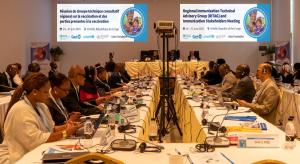Immunization experts urge stronger action to close vaccination gaps in Africa
Brazzaville – Experts, policymakers and global health partners have called for stronger, coordinated action to prevent backsliding on progress made against vaccine-preventable diseases in the African Region, where millions of children are still at risk. Against the backdrop of the signing of the Pandemic Treaty, the reduction in global funding to WHO, Gavi, UNICEF and the Global Programme for the Eradication of Polio is a threat to global health security and to the ambition of polio eradication.
Despite progress in some areas, routine immunization coverage across the African Region remains below the 90% target required to prevent outbreaks. Quality surveillance is under threat Vaccine-preventable diseases such as measles, diphtheria, yellow fever and polio continue to threaten millions of children. Each year, more than 30 million children under five in the region suffer from vaccine-preventable diseases, with over 500 000 deaths, accounting for 58% of global mortality from these diseases.
“We are seeing a worrying rise in repeated outbreaks, from measles and diphtheria to yellow fever, highlighting the urgent need to strengthen routine childhood immunization and disease surveillance across the region. Weak surveillance systems hinder timely detection and response, putting lives at risk. To sustain progress, increased domestic investment and innovative financing solutions are essential—especially as external aid continues to decline,” said Professor Helen Rees, Chair of the Regional Immunization Technical Advisory Group (RITAG), which gathered in Brazzaville from 24 to 27 June to deliberate on ways of strengthening immunization across the life course.
The region also faces growing inequities in vaccine access, particularly in fragile and conflict zones. To help restore immunization services after the COVID-19 pandemic and reach the most vulnerable, World Health Organization (WHO) and partners initiated The Big Catch-Up in 2023. This global effort focused on protecting children who are under-immunised , many of them in hard-to reach areas or marginalized communities. As countries implemented targeted strategies, millions of children gained access to life-saving vaccines such as diphtheria-tetanus-pertussis, measles, and rubella, giving them a stronger start in life and a better chance at a healthy future.
RITAG, which is hosted by WHO, is a platform to shape concrete actions and generate recommendations to guide policy decisions, drive investment, strengthen partnerships and support local vaccine production – all in line with the goals of the Immunization Agenda 2030 (IA2030).
“As we move into the second half of the Immunization Agenda 2030, we must shift from recovery to acceleration. Reaching missed populations, expanding immunization across the life course, and building systems that are resilient, adaptive, and sustainably financed, must be at the core of our strategy,” said Dr Benido Impouma , Director, Communicable and Noncommunicable Diseases Cluster, WHO AFRO
The RITAG meeting took place within a complex and evolving context, where countries face overlapping crises, rising demands, and constrained resources. As the region looks ahead to 2030, these pressures highlight the need for innovative and adaptive approaches. In this environment, WHO and partners continue to call for more flexible, needs-based financing to ensure countries can sustain and scale immunization progress.
During the four-day deliberations, RITAG members and representatives from ministries of health, WHO, Gavi, the Vaccine Alliance, UNICEF, Africa Centres for Disease Control and Prevention, the Gates Foundation, and other partners reviewed the latest data, identified priority actions, and formulated evidence-based recommendations. Discussions addressed strategies to reach zero-dose children, introduce new vaccines, strengthen epidemic preparedness, and expand local vaccine manufacturing.
Composed of leading experts in public health, epidemiology, virology, health systems and community engagement, RITAG – the principal advisory body to the WHO African Region on vaccines and immunization – has provided independent, evidence-based guidance to inform regional immunization policy, support implementation, and promote innovation across the vaccine life cycle, from research to delivery. It was established in 1993.
Amid growing financial constraints affecting the scale and pace of immunization efforts, the forum provided a critical opportunity to reinforce coordination, align technical and financial resources, and identify practical solutions to accelerate country-level implementation. Discussions also focused on advancing equity, strengthening sustainability, and supporting the Region’s path toward vaccine self-reliance. Participants agreed on the need for sustained collaboration, innovative financing, and stronger accountability to deliver on shared immunization goals.




